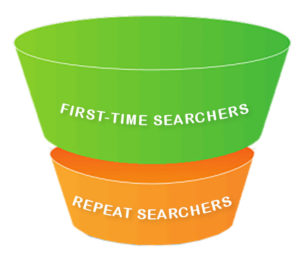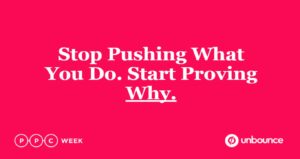I recently had the opportunity to spend three hours a day for one week learning more tricks of the PPC (pay per click) trade from the comforts of my own home, all while making caramel lattes. I don’t want to brag here, but Starbucks may want to ask me for my recipe (#justsaying).
Anyway, the people at Unbounce created PPC Week, a week-long training with respected presenters from various organizations who were designated to provide the digital media industry with best practices, insights, and how-tos. And as a digital media newbie, how could I say no?
I was anticipating a long list of questions on which I would need to follow up with Amanda (our Director of Marketing Strategies). After listening to Corey Dilley, Director of Campaign Strategy at Unbounce, I realized that most of the concepts and processes were relatively easy practices that I could navigate, even as a digital media novice.
What did I learn? Facebook shortcuts, best platforms for specific campaign needs, tips for organizing AdWords campaigns, the list goes on. But today I am focusing on some of the more strategic considerations that can really make an impact for senior living campaigns
Campaign Strategy Is A Thing…?
Yep, every campaign needs to have a planned strategy. Typical campaigns we inherit all appear to have the same basic strategy: A handful of ad groups containing keywords, with ads that all basically sound the same – the only difference being the keywords that are in them.
This strategy can work of course, but think of the possibilities if your ads were to change depending on the searcher. Mind. Blown. Right?
 Purchase funnel levels & the searcher. Does your PPC ad resonate with your prospects during every level of their path to purchase? The ability is there, you just have to apply some strategic thinking.
Purchase funnel levels & the searcher. Does your PPC ad resonate with your prospects during every level of their path to purchase? The ability is there, you just have to apply some strategic thinking.
If new prospects are searching for “retirement communities in Pittsburgh” and they see your ad, they know your location is relative to Pittsburgh and you are a retirement community. Yes, but also give the searcher a feature or benefit as to why your community is a great fit.
Repeat searchers are most likely know the basics of your community from their first search: a pool, dining options, and a new rec center. Give these repeat searchers something beyond basics. Focus on floor plans and pricing. This will help the searcher better understand if the community is still a great fit for them.
Correlation of your PPC ad and landing page. What does your ad promise? Does the dedicated landing page have the same promise with the same call to action?
You already have a feature or benefit in your ad, so be sure that your landing page reinforces the same feature or benefit.
Alluding to price and/or floor plans in your ad is a great promise for searchers, leading them to assume that once they click they will be able to determine if they can afford your community. Be sure to fulfill that ad promise by giving high-level pricing information and/or floor plans of your top selling models.
50+ Marketing Tip: We know online conversions help us to remarket in a multitude of ways and giving all your selling points up front does not always translate to those online conversions. Our new e-book, Social Silver Surfers, suggests building trust with your prospect by giving high level information on the landing page itself but follow that information with an eBrochure, a personal tour, or pricing grid available through a form completion.
Landing page performance & the device used. Does your landing page convert better when viewed on a desktop computer than on a mobile device?
PPC Week speakers Corey Dilly and Joe Martinez suggested to create a landing page for each device: desktop and mobile. By changing the user experience to a mobile-only page, mobile users can focus on the necessary information and not all the content a desktop user sees. Adding buttons and bulleted lists will help the user understand your service more effectively.
At Creating Results, we recommend using a responsive landing page versus two separate landing pages. Responsive landing pages can determine the size of the screen and manipulate the layout of the design to enhance the user’s experience based on the device.
Senior living typically involves a longer path to purchase, so using responsive pages enables the user to still access the full range of information, regardless of device, in a user-friendly format.
Being a digital media newbie, PPC Week gave great insights and key takeaways for me to implement on behalf of our clients. Now I just need to figure out how to create my caramel lattes with our office’s Keurig.
We would love to help you create better results with your campaigns. Contact Patrick McShane today to learn how we can help your senior living community succeed with PPC .







